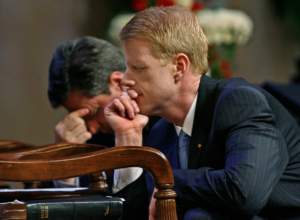The African Heritage Reparation Assembly of Amherst has released its final report for reparative justice to redress racialized harms waged against the town’s African American residents historically and in the present era. Michele Miller lays out the backstory of the release of this final reparations report.
Michele Miller, Chair of the AHRA Committee: Well, this effort began over two years ago after the murder of George Floyd with a community petition by an organization that I and some others started. The petition asked the town Council of Amherst to formally apologize for anti-Black structural racism as well as to create a dedicated reparations fund.
The petition received a tremendous amount of support from the community. And then from there, that led to the creation of the African Heritage Reparation Assembly, which is the town’s committee that has released this report.

Carrie Healy, NEPM: As part of the report process, there were listening sessions and in fact, a community survey was conducted with the help of the UMass Amherst Donahue Institute. Were there any comments in there that really struck you in the feedback?
Yes, absolutely. However, I have been talking to folks in the community for some time, and so there wasn’t anything in there that was completely surprising to me to hear about this community. But what was interesting was to hear the particular experience of individual residents. And it was interesting to hear how the anti-Blackness, how the discrimination that persists in Amherst impacts them and their families.
So, what is necessary and what’s possible for reparations from the town of Amherst, Massachusetts, You know, a town with an annual budget of about $85 million dollars?
Yeah, that’s a great question. So, we have this $2 million commitment from the town, which is a wonderful start. And in the report, we outlined some additional sources of revenue. We hope that this will begin a deeper, community-wide conversation about the role that all of us in the community can play, and that includes organizations and institutions and the ways that all of us can support this effort and support the initiatives that the Black community would like to bring forward.
Well, the report looks at bias in housing to health and transportation, policing and more. What are the priorities that the committee has identified in terms of reparations?
Moving forward, given our consultation process with the Black community and the broader community, we have identified three funding priorities. The first funding priority is youth programing.
A previous group, the Community Safety Working Group, developed some proposals that included a BIPOC Youth Center. So, we have uplifted that recommendation, and that is one of the areas that our report focuses on.
We also have focused on affordable housing as well as business grants and entrepreneurial training. So those are the three priority areas that we have identified. And then as you see in the report, there are other recommendations and other forms of reconciliation and repair that we recommend.
So, this report has recommendations for moving forward. This committee’s work, however, is done. What’s next?
What we would like to see and what we call for in the report is for a successor body to be formed by the town council and for an acceleration of the $2 million commitment so that initiatives can be pursued immediately.
Our report calls for $100,000 annually beginning as soon as the next budget cycle, so that the initiatives that we’ve outlined, as well as initiatives that may be brought forward by the community in, you know, in the near future, can be pursued.




